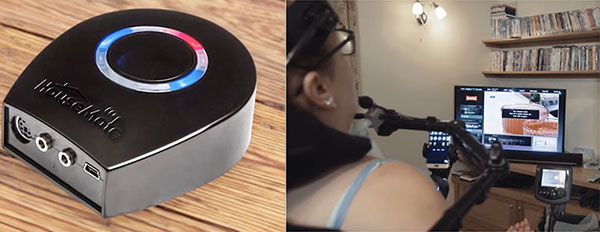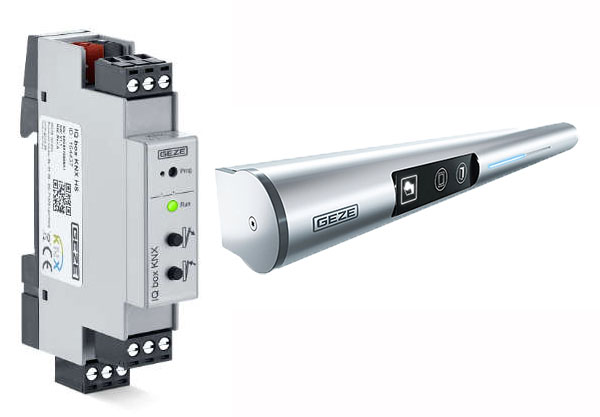
Andy Ellis looks at how standard KNX technology can be used to help elderly and disabled people have control over their environments, and gives some great practical examples of installations using assistive technology.
Assistive technology can help people stay independent and perform tasks that they had previously found difficult or impossible for various reasons. These could include congenital physical disabilities that may or may not get progressively more severe with time, disabilities arising from an accident, age-related limitations, etc.
Assistive technology can take many different forms, but in this article, we will focus on our experience of specifying, designing, installing and maintaining KNX equipment for providing enhancements to, or changing methods of interacting with, assistive technology.

Market size
The assistive technology market is growing. In the UK for example, statistics show that roughly 14 million people in the UK are registered disabled. Around 44% of pension-age adults are registered disabled, and approximately 6.5 million people have a physical disability. It is generally agreed that the overall assistive technology market is forecast to grow around 5% year on year, for the foreseeable future.
Assistive technology
Whether the client is elderly, disabled, living at home or in residential care home, there will be suitable assistive technology available. Some products will be ‘plug and play’ and some will require more complex installation. Some will be ideal for new builds, whilst others are more suited to retrofit or refurbishment of old buildings.
Assistive technology is not necessarily much different from the mainstream, it just has to be a bit more focussed and must be reliable. Indeed assistive products are often everyday items that are being used in a particular way by a person with special needs. A good example would be the smart phone, or one of the voice activation devices.
For those with a physical disability, general KNX-controlled lighting, heating, blinds and video entry will form the basis of their installation, but there will also be the need for products that are not as commonplace in the home automation environment. These include window and door openers, and improved front-end controls for smart phones or voice activation.

allow complete hands-free control (right) of automatable household devices and functions (image source: housemate.ie).
The final set up and programming is where more functionality and enhancements can be implemented, and, as assisted living installations require a greater degree of maintenance, service contracts after the first year of installation are normal.
Examples of KNX-based assistive technology installations
For a new commercial hospital ward with separate self-contained living accommodation for short-stay disabled persons, we installed KNX lighting, KNX heating and a Geze KNX interface to door and window openers. The KNX equipment is available to operate from a smartphone, whilst the building manager also has software access to it. Presence detectors are used to control passageway lights, with reduced brightness at night, and elements of AI are used to detect and monitor residents’ movements and temperature.

In the refurbishment of a family home to accommodate a disabled member of the family, we followed the occupational therapist’s recommendations by installing KNX lighting, heating, automated windows, blinds and doors, plus an IT network with full wireless coverage. Control of lighting, heating and blinds is via smartphone and voice activation. We work closely with voice activation software specialist PCByVoice in order to ensure a coherent design and implementation.
In a home retrofit project for disabled living, we provided control of KNX-automated windows and blinds from the existing control set up on the client’s wheelchair. This allowed the client to open windows in the kitchen and bathroom, and operate the windows and blinds in selected bedrooms.
VAT relief for disabled people
The good news in the UK is that disabled people are not charged VAT (Value Added Tax) on products designed or adapted for their own personal or domestic use. They are also then not charged VAT on the installation and any extra work needed as part of this; on repairs or maintenance; and on spare parts or accessories.
Conclusion
As a KNX professional, there is no reason why you cannot expand your business into the assisted living market. The baseline equipment is very similar, and with the addition of a few choice products to enable, for example, window and door opening, you can expand your service into this growing sector and have the added advantage of almost guaranteed service and maintenance contracts.
By working alongside people with physical disabilities, you will gain a greater understanding of the added functionality required, and gain useful feedback to further improve their environment. Of course, finding the right client at the right price point is always a challenge, but given the longevity of KNX installations, the pay back for the customer can be measured over years of trouble-free operation.
Andy Ellis is the founder and managing director of Household Automation Ltd, and its sister company Knxion Ltd, providers of building automation consultancy, design, installation and aftercare services to clients who are involved in building residential and commercial properties.












